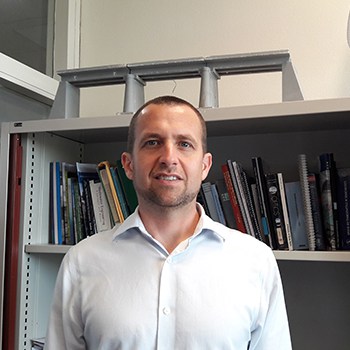Location
2016 GG Brown, 2350 Hayward, Ann Arbor, Michigan 48109-2125
Phone
Primary Website
Education
- Ph.D. in Civil & Environmental Engineering, Stanford University, 2003
- M.S. in Civil & Environmental Engineering, Stanford University, 1999
- B.S. in Mechanical & Aerospace Engineering and B.A. in Physics, Rutgers University, 1996
Research Interests
My students and I utilize hydraulic laboratory experiments, numerical simulations, and post-disaster field surveys to investigate the resilience of structures and infrastructure exposed to both increasing hazard due to climate change and increasing consequences due to expansion of development in coastal and flood-prone areas. This research focuses on four main themes:
- Damage: We quantify damage to infrastructure and structures from extreme events such as tsunami, storm surge, and floods. Here, we measure damage and hindcast physical forcing, with the goals of clarifying damage mechanisms, relating damage level to forcing strength and structure type and evaluating proposed countermeasures to damage.
- Flood phenomena: We investigate physical flow phenomena that cause damage during extreme events. Since low-probability, high-consequence events such as tsunamis and landfalling Category 5 hurricanes and typhoons are difficult to predict and instrument, data describing their effects are insufficient. We use laboratory experiments, numerical simulations, field measurements and crowdsourced data to investigate extreme flood events.
- Countermeasures: We assess the effectiveness of inundation countermeasures such as seawalls, breakwaters, levees, and storm surge barriers on reducing damage to urban areas and risk to individuals. The interaction among engineering and planning with sociology and culture requires investigation in an interdisciplinary manner, to assess how effective countermeasures will be in a given context.
- Hydropower: We assess the feasibility of new and retrofit sites, and evaluate technologies, for hydropower and pumped hydro storage. With the proliferation of intermittent renewable energy sources like wind and solar, energy storage is increasingly necessary to meet demand and regulate the grid.
Professional Service
- Editor of the Journal of Coastal and Hydraulic Structures
- Professional Engineer (Civil), in California and Washington State
- Associate member of the American Society of Civil Engineers (ASCE 7) Tsunami Loads and Effects subcommittee
- Editor of Coastal Engineering Journal (Japan Society of Civil Engineers)
- Associate Editor of Hydrological Research Letters (Japan Society for Hydrology and Water Resources)
Awards
- 2016, 2019 ASCE Journal of Waterway, Port, Coastal, and Ocean Engineering, Outstanding Reviewer Recognition
- 2016 Japan Society of Civil Engineers (JSCE) Coastal Engineering Journal Most Cited Paper Award
- 2008 URS Corporation, Quarterly Outstanding Achievement Award
- 2001 Stanford University, Centennial Teaching Assistant Award
Publications
Please see my Google Scholar profile
